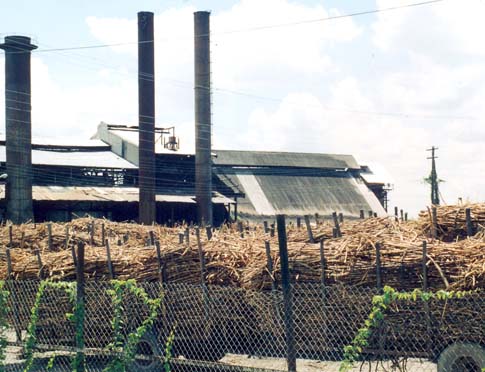The Guyana Sugar Corporation (Guysuco) has reduced its supply of sugar to Caricom by 80,000 tonnes over 2004 levels and increased supply to the European Union, Chief Executive Nick Jackson said.
He said this was because of reduced production, mainly owing to inclement weather.
In response to queries from the Stabroek News on Guyana’s sugar exports, Jackson said Guyana has given up exporting raw sugar to Suriname, Barbados, Grenada and St Lucia this year and has not supplied sugar to Jamaica for two years now. However, Guyana still supplies raw sugar to neighbouring Trinidad and Tobago, which is a big consumer of the product.
“We are however maintaining our presence for Demerara Gold and other retail products within the region,” Jackson said.
In addition, he said that unlike most other Caricom sugar producers, which export their sugar to Europe and import for local consumption, Guysuco was meeting the demand at home. The local demand for raw sugar is some 25,000 to 30,000 tonnes per annum. Guyana also imports some 10,000 tonnes of refined (white) sugar per annum.
Jamaica, Suriname, Barbados, Grenada and St Lucia would normally have to pay common external tariffs (CETs) on sugar and rice imported into the region. However, they have been granted waivers to import by Caricom with the approval of Guyana and other Caricom sugar producing/exporting countries.
Jackson said the situation was not as simple as it first appeared to be.
The uncertain weather patterns over the past three years, including the floods of 2005, he said has had an effect on production.
“We have more market share available to us in the EU,” he said adding, “we have the US$ exchange rate more favourable to the euro.”
He noted that there were cuts in the price of sugar in 2006 and last year with losses in revenue. Another cut is expected this year.
Trinidad and Tobago and St Kitts and Nevis have given up a combined EU quota of 69,000 tonnes and an additional 30,000 tonnes were secured to cover the period to September 2009 when the Sugar Protocol comes to an end.
“We are faced with the dilemma of supplying the EU at a higher price [compared to Caricom] in the short term against giving up market share in our backyard,” Jackson said.
”This is something that all Caricom sugar producers are faced with and all choose the EU. In this respect we are no different. However this strategy does open up the Caribbean to imports and will make it hard in the future to get back into the market.”
Earlier this year, Jackson had hinted to the corporation’s board of directors the possibility of importing sugar for the local market, while exporting to the EU after work had been suspended in Berbice owing to poor weather conditions. (Miranda La Rose)






